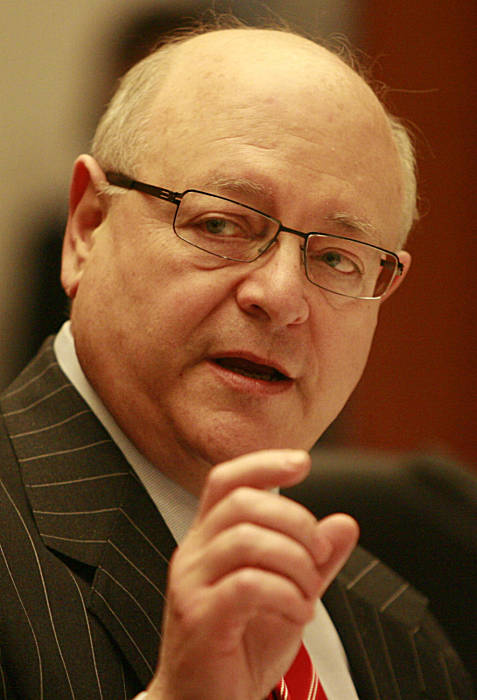 President Yudof will be Remembered For Doubling Student Tuition – University of California President Mark Yudof, 68, announced on Friday that he would be stepping down from his position effective August 31, 2013. His tenure will be remembered largely for the doubling of student tuition, as the university system struggled to grapple with a lengthy economic crisis.
President Yudof will be Remembered For Doubling Student Tuition – University of California President Mark Yudof, 68, announced on Friday that he would be stepping down from his position effective August 31, 2013. His tenure will be remembered largely for the doubling of student tuition, as the university system struggled to grapple with a lengthy economic crisis.
At the same time, he drew controversy for taking a salary nearly twice that of his predecessor.
The San Francisco Chronicle reported that, “By completing five years, Yudof can add $230,000 a year on top of his pension, which he’ll collect only after he retires from UC. The bulk of his retirement pay will come from prior employers: the University of Texas, where he spent most of his career, and the University of Minnesota.”
In a lengthy statement he said, “UC remains the premier public university system in the world, and I was both honored and humbled to serve as its president for what has been nearly five years now. I will miss my daily interactions across the system with so many dedicated, capable, and intellectually stimulating people.”
“Over the past few months, however, and after careful consultation with my family, it has become clear to me that the time has come for me to step away and return to the teaching of law on the Berkeley campus,” he said citing “a spate of taxing health issues.”
“Though these challenges have been largely overcome, I feel it is time to make a change in my professional lifestyle,” he said.
With the economy finally improving, he believes that this is the appropriate time “for the University to bring in fresh leadership.”
“When I arrived in 2008, the economy had begun to unravel and state coffers were tumbling deep into the red. With its budget slashed, the University was presented with one of the most severe challenges in its history,” he said.
During his tenure, Mark Yudof led the way toward the rise of tuition, often in double digits as the state reduced funding to UC by $900 million from 2008 until the present. Tuition would rise from $6,636 to $12,192.
Now President Yudof believes things have improved.
“Now, it appears the storm has been weathered. We are not fully in the clear, but we are much closer than we were even a few months ago,” he said. “I look forward to working closely in the months ahead with Governor Brown, Assembly Speaker Perez, Senate President Pro Tem Steinberg and other state leaders to ensure that the University is positioned to continue on this forward course, which ultimately will benefit all Californians.”
He added, “It is important to note that we – members of the entire UC community – have made it through this rough passage with our fundamental attributes intact. We have preserved excellence in our academics, research and health care. We have kept our doors open to all worthy students, regardless of family income levels, embracing the Blue and Gold financial aid program for low and middle income students and raising more than $671 million through the Project You Can scholarship program.”
“Many, many people contributed to this remarkable achievement: employees, including tenured faculty, who accepted without complaint a furlough program that cut into their paychecks; students and their families, who endured rising tuition rates; administrators and staff, who worked with great vigor and creativity to carve out savings through improved efficiencies, and California voters, who finally agreed that the cuts needed to stop and brought relief last November by approving Proposition 30,” he said. “I applaud and am thankful for all of these contributions.”
But President Yudof was often the target of anger from student protesters, both because of his perch and due to his large salary.
At the same time, defenders argue that under his presidency more low-income students attend UC than ever before. Programs have been created to allow low-income students to attend without paying tuition, and his institutional aid program benefits students whose families earn up to $80,000.
President Yudof drew praise from the leadership in the state legislature.
Speaker John Perez said on Friday, “Throughout his service as President of the University of California, Mr. Yudof has been an exceptional leader, particularly during a difficult period in the history of the UC. I have always been appreciative of the thoughtful and engaging way he has worked with students, staff, the Legislature and the Regents of the University to ensure that the UC remains the premier system of higher education in the world, even despite historic budget challenges.”
He added, “He has been a leader of conviction and vision, and I am very grateful for his service to the UC and the people of California, and I look forward to continue working with him in his future endeavors.”
Darrell Steinberg added, “I’m especially appreciative of President Yudof’s leadership of the University California, bridging the gap between secondary schools, higher education and the working world by fostering stronger ties between classroom and careers.”
“The UC system has just received a record number of freshman applications, not only from California high school seniors but from around the country and the world. The proof is in the numbers; the University of California remains a preeminent institution of higher education that’s renowned worldwide, despite several years of challenging financial waters navigated by UC with President Yudof at the helm,” the Senate President Pro Tem said. “I extend my gratitude to Mark for his dedicated service, and look forward to working closely with him in the next several months as the University of California makes the transition to new leadership.”
On the other hand, Senator Leland Yee was a fierce critic of President Yudof, and defender of student organizations.
He said on Friday, “Today, I hope we finally begin a new chapter at the University of California. Unfortunately, under President Yudof’s leadership, students and workers unfairly suffered while top executives got wealthier.”
“To make matters worse, Yudof leaves the university with a $1 million pension that will be paid on the backs of students and taxpayers,” Senator Yee said. “I urge the Board of Regents to conduct a transparent presidential search with the full input of students, faculty and workers; and rather than focus on a candidate who demands an extravagant salary and retirement package, they choose someone who wants to give back to the people of California.”
It was the rising tuition and the UC response that led to police-student confrontations at several universities in the fall of 2011 including UC Davis’ pepper-spraying incident. President Yudof drew criticism from many when he hired Kroll to investigate the incident on the UC Davis Quad, which resulted in numerous students being pepper sprayed and arrested. He also had the foresight to bring in retired California Supreme Court Justice Cruz Reynoso to head the task force that ultimately called the police and administration to task for the confrontation.
—David M. Greenwald reporting






Jerry Brown takes on UC excesses Yudolf retires within days.
Linda Katehi?
Hope not.
Good riddance. He has not been good for the University. I hope we don’t have to pay for his moving costs too.
I’m pretty sure Mitt Romney is available. Someone should give him a call.
I think Obama would be a better choice. Then we could have free college for all with huge debt and no clue how it all would ever be paid for.
Yudof was a good leader who will be remembered for getting the university through an economic crisis with its academic reputation preserved and even improved. He is far more capable than previous presidents such as Atkinson.
In my opinion, those who criticize him don’t understand the problems he faced and overcame.
My problem is that while you have a point, he made it a point to heap the hard times on the people at the bottom – lower wage earners and students while giving large raises to people at the top.
Also, Yudof’s Blue and Gold plan was really a mechanism to push more of California’s tax burden on the middle class, indirectly. Middle class families who didn’t qualify for free tuition had part of their tuition dollars going to fund the tuition of students from families that had lower income.
Nothing wrong with that, but it’s the *proportion* that was wrong and out of balance. This funding should have been done by way of the state income tax, so that those in the upper brackets continued to pay their fair share.
In other words, part of the tuition money paid by UC students and their families was actually (and still is) taking the place of revenue that should have been (and should be) raised through the state income tax.
Brian, what you say is correct. But Yudof and the Regents do not have the ability to levy state income taxes.
As far as what David says, there is some truth in that too. Yudof was often blind to the appearances of the pay raises given to administrators, He also did little to fight administrative bloat. Certainly the UC Office of the President has a good number of incompetent administrators, as does UC Davis. Unfortunately these people each has a constituency that makes it very hard to eliminate their positions. This is the curse of public bureaucracies.
@J.R.: Yes, what I was alluding to is that it appears that Yudof was hired as part of the hocus-pocus, short-sighted policy goals of the Schwarzenegger administration that included the technique of shifting revenue generation around in counterproductive ways.
For example, he probably told Sunne Wright McPeak, his Secretary of the Business, Transportation & Housing Agency, to simply raise more revenue by instructing the California Highway Patrol to issue more traffic tickets.
As Philip Trounstine, a former aide to Gov. Davis stated in 2005 about Schwarzenegger when his job-approval ratings were falling: “You’ve got to give the man credit. He’s a very savvy guy, but something isn’t working. The numbers suggest people aren’t buying his shtick.” (San Bernardino Sun, April 8, 2005)
Just to give one example of Schwarzenegger’s activities in the realm of higher education, the University of Phoenix gave Schwarzenegger $50,000 in November 2009 to send five of his aides on an oversees trip (http://tinyurl.com/b56mkns).
If someone wants to do the checking, I think we’ll see that UC Regent Richard Blum, probably used similar methods of making donations to have influence on Schwarzenegger to push for the privatization of the UC. I’ve lost the reference now, but I recall there was one aide in particular under Schwarzenegger (a male) who was pushing for the privatization of higher ed in California. See also: http://www.berkeleydailyplanet.com/issue/2010-06-22/article/35661